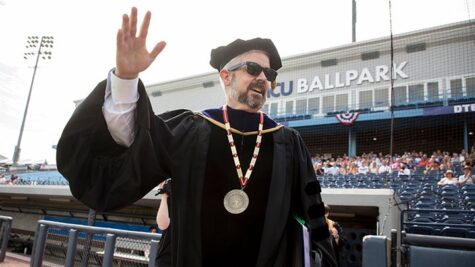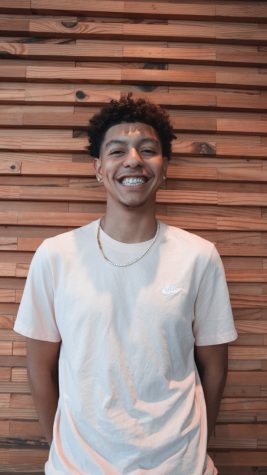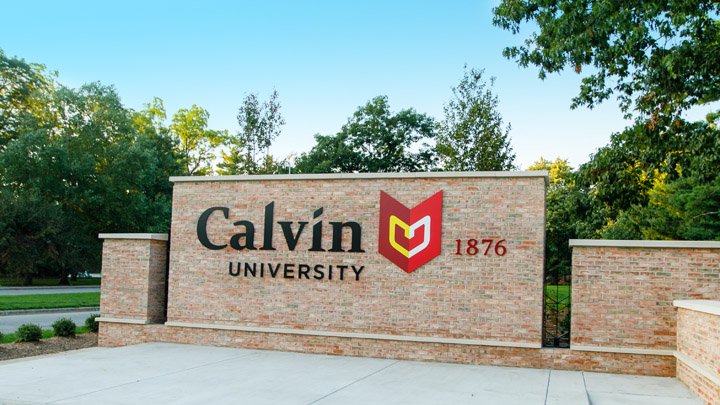Photo courtesy Calvin University
Presidential Search Committee hunts for new hire
September 12, 2021
In preparation for President Michael Le Roy’s 2022 departure, a Presidential Search Committee has been formed to guide the university’s search for a new highest administrator. The PSC is composed of 16-members: trustees, faculty, external community, alumni, administrators, a student and a representative of the Christian Reformed Church in North America. Members were selected by the Executive Committee of the Board of Trustees, which “solicited nominations and input from all Calvin constituencies,” according to an Aug. 9 email from the PSC.
As Calvin’s 10th president, Le Roy took office in 2012 after the retirement of former president Gaylen Byker, who had served since 1995. His decade at Calvin has seen the development of the university’s Vision 2030 Strategic Plan, as well as the campus master plan and an educational framework based on learning, faith, citizenship and vocation. Le Roy announced his upcoming departure in June 2021.
Committee work timeline
To help formulate a process for the search and reach a large pool of applicants, the PSC hired a search firm, AGB Search. The firm specializes in leading administrative hiring searches in higher education.
The next step is a community survey, sent out in a campus-wide email on Sept. 10, which will solicit opinions regarding the direction of the search from students, faculty, staff and friends of Calvin. The survey will be open for one week. Using these responses, the committee will write a position profile, a document outlining the position the university is looking to fill and describing the skills and abilities being sought.

The release of the position profile sometime around October will officially open the search. According to Craig Lubben, the committee’s vice chair, the goal is to be able to recommend a candidate to the Board of Trustees around February.
The PSC hopes to have their recommendation accepted by the Board of Trustees soon enough for the new hire’s transition to be eased by overlap with Le Roy, whose tenure ends at the end of June 2022.
A website providing more frequent updates on the search is set to be developed this month.
Committee composition
Lubben is a 1978 Calvin alumnus. He graduated from Northwestern Law School in 1981 and has since worked with Miller Johnson Attorneys in Grand Rapids and Kalamazoo. Lubben’s is a familiar Calvin story: his parents went to Calvin, he met his wife at Calvin, his children went to Calvin. He ended a 9 year term on the Board of Trustees in 2020, serving as chair of the board for the last five of those years.
The PSC is chaired by the current vice chair of the Board of Trustees, Mary Tuuk Kuras. Tuuk Kuras reached out to Lubben to recruit him to serve on the committee as an “at large” member. His experience working closely with the president made him a good candidate for vice chair of the PSC. The Board of Trustees was responsible for officially appointing all committee members.
Lubben told Chimes that the makeup of the committee is largely determined by a policy for presidential searches developed by the Board of Trustees in 1994; this policy requires a committee of up to 16 people: four trustees, three faculty, two administrators, one alumni, one student, a representative of the CRCNA, and up to four at-large members.
The 2021 search committee has three at-large members: Lubben, Heather Templeton Dill and Sidney Jansma.

Templeton Dill serves as president of The Templeton Foundation, which awarded the Templeton Prize to Calvin’s Al Plantinga in 2017. “[Dill] has a broad connection in the Christian community and the Templeton Foundation does as well,” Lubben told Chimes. “…She comes from a little bit outside the Calvin community…she brings a different perspective and we thought that would be helpful.”
Jansma is a founding donor of Calvin’s school of business. He also currently serves as chair of the board at Wolverine Gas and Oil Company, which is responsible for one of the US’s largest onshore oil discoveries in recent history.
Roughly 43 percent of the members are women, and at least 25 percent are members of racial and ethnic minorities. Alumni make up 68 percent of the committee.
Samuel Carrasco, the student representative on the committee, is a senior studying social work. He has lived in Grand Rapids for the last 11 years and heard about Calvin through his teachers at Potter’s House Christian School. He told Chimes he came to Calvin for financial aid, but stayed for the community he found.
Through Carrasco’s work with the Students of Color Presidential Advisory Group, he had an opportunity last year to speak to the trustees. According to Carrasco, that opportunity led Tuuk Kuras to reach out to him about serving on the committee.
As the only student on the committee, Carrasco said he wants “to make sure that I’m doing my best to represent not only myself and the people close to me and how I want to see Calvin, but also making sure that everyone feels like they’re being heard…I want to make sure everyone is like ‘okay, I can resonate with the president in some way’…that they feel like this is their home.”
Carrasco spoke to the delicate balance between moving the university forward and sticking to its roots: “We understand we’re moving forward as a society,” Carrasco said of the committee, “and so it’s like how much do we go along with society and how much do we hold onto our roots? How do we make sure we’re being inclusive of all people while still maintaining the core values of Calvin and what we want Calvin to be?”
Lubben also spoke to the need for putting a high premium on inclusion.
“The board itself is concerned about its diversity in terms of gender and race and that’s a factor that we continue to work on,” Lubben said. “Calvin, as you know, is governed by the CRC. I submit that there are few churches that are more focused on diversity and inclusion than the CRCNA. The church recognizes that the kingdom of God is made up of all kinds of people and therefore if we as a church want to be effective we need to look like the kingdom of God…That’s our goal for Calvin as well… and we’re always trying to get better.”
Hopes for the future
According to Lubben, the committee is looking for someone who is deeply committed both to the faith and to Calvin’s mission.
“I believe God’s got the right candidate picked out for us already. And our job is to find that person,” Lubben said. “I think we’re going to do that. I think we’ve set forth a process that’s going to allow us to make a broad and inclusive search and I think we’re going to find the right person.”
Asked if “commitment to the faith” would limit the search to candidates within the CRC, within the Reformed tradition, or simply within a Christian tradition, Lubben responded, “I don’t know.”
“I think when the search committee started the search that led to President Le Roy they didn’t start out by saying ‘we want someone who’s Christian Reformed,’” Lubben said. “They started by saying ‘this is the position’ and they looked at the applicants. President Le Roy, as you may know, was Presbyterian when he applied for the position. I do think…I think I’ll leave it at that.”
“To the extent that the mission is tied to the Reformed tradition,” Lubben said, “that leads me to think you’re going to have to have someone who’s committed to the Reformed tradition. But I don’t know, we’ll see what God does.”
Reverend Scott Greenway, senior pastor of Caledonia Christian Reformed Church and a 1986 graduate of Calvin, is the CRC’s representative on the committee. “I believe the ideal candidate will be a devoted follower of Jesus Christ and excited about the historic mission of Calvin University,” Greenway told Chimes. “And I also believe it’s important in the selection process to listen to those who care deeply about Calvin University. And we are doing just that. We are listening carefully, discerningly, to staff, faculty, and alumni as we seek God’s will in this.”
Faculty echoed Lubben and Greenway’s hope for a new hire dedicated to Calvin’s mission.
“Our next president needs the courage to chart a course true to Calvin’s mission—one deeply rooted in Reformed Christianity and committed to a broad liberal arts education, and one that refuses to capitulate to the commodification of higher education or to culture wars categories that impede our ability to think deeply, act justly, and serve as agents of renewal in society, and as a beacon of faithful intellectual life for the church,” history professor Kristin Du Mez told Chimes.
Philosophy professor Kevin Timpe said: “I hope that whoever the next person is, they are strongly committed to a robust liberal arts vision for Calvin’s future, given how central such a vision is to our heritage and identity. I’d also love to see us live out what we say about diversity being important—not just racial diversity per the FEN document, but also in terms of sex, ability status, class, etc…”
“I hope that our next president has a deep love for the Reformed tradition, a real calling to distinctively Christian higher education, a wide-ranging curiosity, a firm grasp of the liberal arts, an appreciation for the wonderful things already going on at Calvin coupled with an innovative institutional imagination,” Provost Noah Toly told Chimes, “and, finally, a hopeful confidence in what God is doing in the world.”
Carrasco emphasized interpersonal relationships in his ideas for the new hire, saying he hopes the new president will be “someone who’s willing to take the time to understand where people are coming from…someone who’s constantly challenging themselves to do better, someone who’s confident yet humble…someone who’s active in the community…someone who can bring a room together.” Carrasco also said he hopes the new president will be “willing to admit when they don’t know or when they’ve wronged anything or anyone,”and will follow the biblical teaching to “be the salt” of the world.
Chimes’ Jocelyn Nuñez-Colón contributed to this story.
Correction: In an earlier edition, Du Mez’s name was misspelled. Chimes regrets this error.
